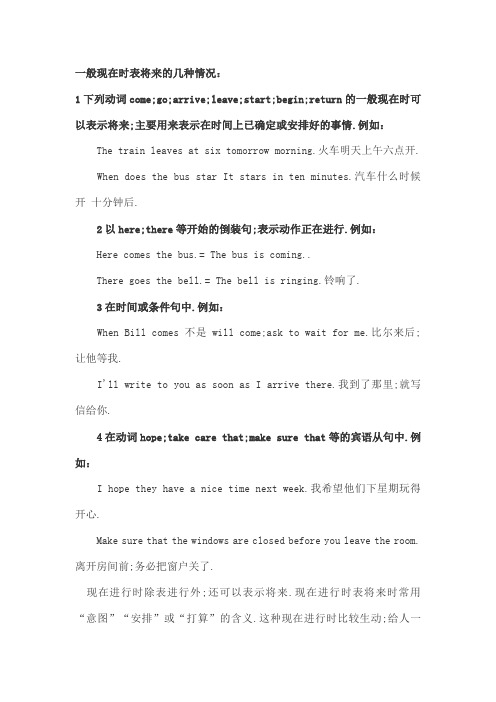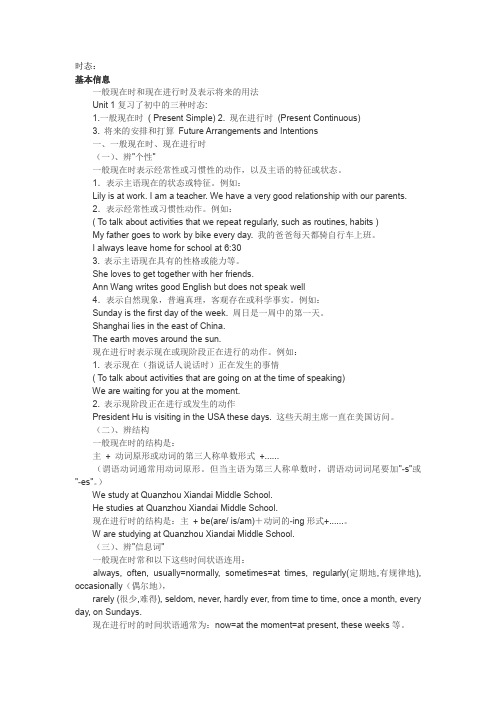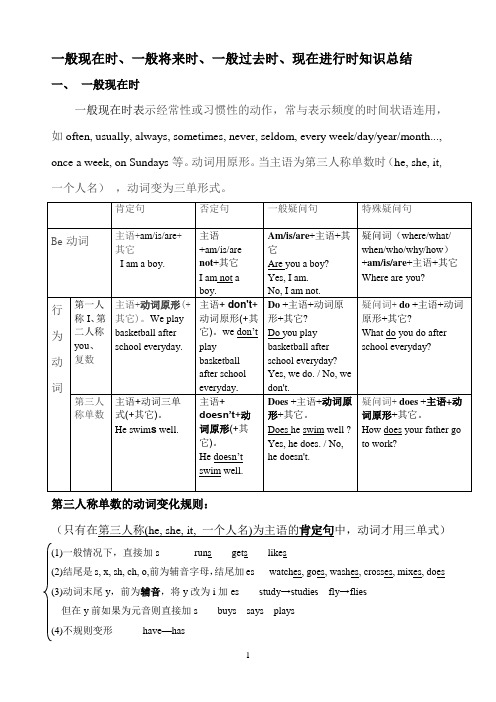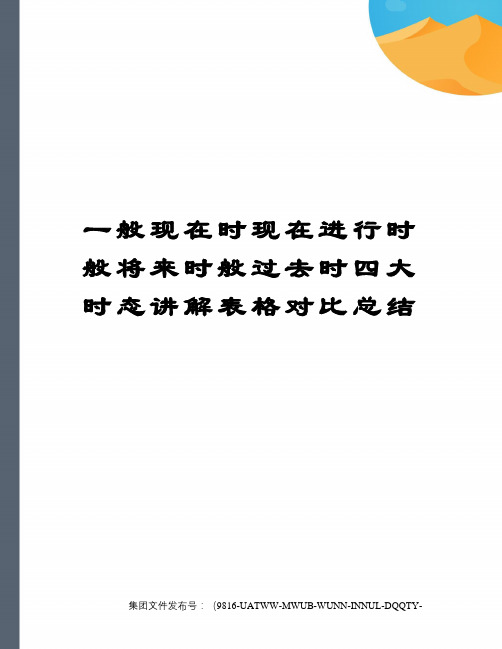一般现在时表将来 现在进行时表将来
一般现在时表将来一般现在时表将来一般现在时和现在进行时表将来有什么区别如题.

一般现在时表将来-一般现在时表将来一般现在时和现在进行时表将来有什么区别?如题.下列动词:come,go,arrive,leave,start,begin,return的一般现在时表将来。
一般现在时表将来这主要用来表示在时间上已确定或安排好的事情。
The train leaves at six tomorrow morning。
When does the bus star?It stars in ten minutes。
用现在进行时表将来时(表示按计划安排要发生的事件。
) 一般现在时表将来一般现在时代替将来时时间状语从句,条件句中,从句用一般现在时代替将来时When,while,before,after,till,once,as soon as,so long as,by the time,if,in case (that),unless,even if,whether,the moment,the minute,the day,the year,immediately He is going to visit her aunt the day he arrives in Beijing。
他一到北京,就去看他姨妈。
典型例题(1)He said he________me a present unless I_______ in doing the experiment。
A。
had not given; had not succeeded B。
would not give; succeed C。
will not give; succeed D。
would not give; will succeed。
答案B。
在时间,条件或让步主语从句中一般不用将来时。
本题有He said,故为过去式。
主句用将来时,故选B。
此处用一般过去式代替了过去将来时。
(2) 表示现在已安排好的未来事项,行程等活动。
The museum opens at ten tomorrow。
一般现在时表将来的几种情况

一般现在时表将来的几种情况:1)下列动词come,go,arrive,leave,start,begin,return的一般现在时可以表示将来,主要用来表示在时间上已确定或安排好的事情.例如:The train leaves at six tomorrow morning.火车明天上午六点开.When does the bus starIt stars in ten minutes.汽车什么时候开十分钟后.2)以here,there等开始的倒装句,表示动作正在进行.例如:Here comes the bus.= The bus is coming.车来了.There goes the bell.= The bell is ringing.铃响了.3)在时间或条件句中.例如:When Bill comes (不是will come),ask him to wait for me.比尔来后,让他等我.I'll write to you as soon as I arrive there.我到了那里,就写信给你.4)在动词hope,take care that,make sure that等的宾语从句中.例如:I hope they have a nice time next week.我希望他们下星期玩得开心.Make sure that the windows are closed before you leave the room.离开房间前,务必把窗户关了.现在进行时除表进行外,还可以表示将来.现在进行时表将来时常用“意图”“安排”或“打算”的含义.这种现在进行时比较生动,给人一种期待感.1.它常表最近或较近的将来,所用动词多是转移动词.如:(1) I’m going.我要走了.(2) I'm coming.我要来了.(3) When are you starting你什么时候动身2.表将来的现在进行时除用于转移动词外,亦可用于某些非转移动词.如:(1) I’m meeting you after class.课后我找你.(2) What are you doing next Sunday下星期你打算干什么(3) She is buying a new bike soon.她不久将买一辆新自行车.3.但偶尔也表示较远的将来.如:When I grow up,I’m joining the army.我长大了要参军.4.表将来的现在进行时有时含有“决心”的意思,多用在否定结构中.如:(1) I’m not going.我不走了.(2) I’m not waiting any longer.我不再等了.5.有时也用在肯定结构中.如:I’m backing out.我要打退堂鼓了.6.用这种现在进行时与对方讲话时可变成命令,不过语气比较温和.如:(1) You are staying.你留下吧.(2) Don’t forget:you are taking part too.不要忘记:你也要参加.7.同一般现在时一样,现在进行时也可在时间、条件或原因状语从句中表示将来.如:(1) when you are passing my way,please drop in.你什么时候路过我们家,请进来坐.(用于时间状语从句)(2) If they are not doing it,what am I to do如果他们不干,那我该怎么办(用于条件状语从句)(3) She is going to the dentist tomorrow because she is having a tooth filled.8.表示将来的现在进行时也可用在间接引语中,表示说话人相信它将是事实.如:He said he is going tomorrow.他说他明天走.9.表将来的现在进行时有时从属于将来时态.如:(1) On election night we’ll be telling you what’s happeni ng in various places in this country.到了选举的夜晚,我们将把全国各地的情况告诉大家.(2) when I have time,I’ll come down to the school to see how you’re both doing.我有空时,会来学校看你们俩的学习情况.现在进行时态练习题一、.按要求改写句子1. The boy is playing basketball.否定句:____________________________一般疑问句:_________________________肯定回答:______________________否定回答:______________________对"is playing basketball"提问:__________________________对"The boy"提问:__________________________2. They are singing in the classroom.否定句:____________________________一般疑问句:_________________________肯定回答:____________________否定回答:______________________对"are singing"提问:__________________________对"in the classroom"提问:__________________________二、. 用现在进行时完成下列句子1. What _________ you __________ (do)2. I _____________ (sing) an English . What ________ he ____________ (mend)4. He ______________ (mend) a car.5. ______ you __________ (fly) a kite Yes, _____________.6. ______ she ___________ (sit) in the boat7. ______ you _____________ (ask) questions8. We _______________ (play) games now.9. What are you _________(do) now I ___________(eat) bread.10. It's nine o'clock. My father_______________(work) in the office.11.?? Look, the boy____________(put) the rubbish into the bin.12.?? __________he__________(clean) the classroom No, he isn't. He____________(play).13. Where is Max He___________(run) on the grass.14.?? Listen, who____________(sing) in the music roomOh, Mary_____________(sing) there.过去进行时态练习题过去进行时练习:用动词的适当形式填空.we __________ (wait) for the bus,a girl __________ (run) up to us. __________ (telephone) a friend when Bob __________ (come) in.__________ (jump) on the bus as it __________ (move) away.__________ (test) the new machine when the electricity __________ (go) off.__________ (not want) to stay in bed while the others ________________(all,work) in the fields.mother ________ (put) Cathy to bed,the door bell ________ (ring)._____ (have) my breakfast at half past six yesterday morning._____ (go) over her lessons from six to seven last and peter ____(do) the same thing._____ you ___ (do) at that timeWe _____ (watch) TV.your father at home yesterday eveningYes ,he _____ (listen) to the radio. _____(not make) a model ship when I saw him.they ____ (have) a meeting at 4 yesterday afternoonNo,they _____ (clean) the classroom.it ______(rain) when you left schoolYes,it ____.(No,it ____)_____ your father _____ (do) when he was your ageday,Edison _____ (wait) for a train to arrive,and suddenly a little boy ran to the track(轨道) to play.asked me if I ______ (go) fishing that afternoon.three of them were in a hurry because their plane _____ (leave) in five minutes.a letter,john told us that he _____ (come) to china next month.the bell rang,jenny _____ (wait) in her seat._____ (make) her dress the whole afternoon.my father ____ (look) through the evening paper,he suddenly ____ a cry.。
表示将来的时态(一般现在时表将来,现进表将来以及一般将来时)

我相信,中国将会变成世界上最富有的国家之一。
There is going to be a heavy rain.
将会பைடு நூலகம்一场大雨。
②be going to和will均可表示“意图”:事先考虑过的意图用be going to;不是 事先考虑的意图即临时决定的用will。 I’m going to Qingdao this weekend. 这个周末我要去青岛。 —Sorry,I forgot to buy the book you need. ——对不起,我忘了去买你要的书了。 —It doesn’t matter. I will go myself. ——没关系。我自己去买就行了。
一般现在时
在时间和条件状语从句中可用一般现在时代替
一般将来时。 I’ll let you know as soon as I hear from him. 我一接到他的信就告诉你。
现在进行时
有些动词,如come, go, leave, return, arrive,
begin, start等,它们的现在进行时可表示不远 的将来要发生的事情。例如: Flight 1095 is landing soon. 第1095号航班马上要着陆了。
(
(
)5. Look! Some visitors __ for the bus over there. (2015南宁) A. are waiting B. is waiting C. waiting D. Wait
( (
) 6. ---What were you doing at 5:30 yesterday afternoon? --- I ______ with Sam.(2016 钦州) A. walk B. walks C. was walking D. walked )7. — What are you going to do tomorrow?(2014 柳州) — I ______ visit my aunt. A. went to B .go to C. am going to
一般现在时表将来的几种情况

一般现在时表将来的几种情况:1下列动词come;go;arrive;leave;start;begin;return的一般现在时可以表示将来;主要用来表示在时间上已确定或安排好的事情.例如:The train leaves at six tomorrow morning.火车明天上午六点开.When does the bus star It stars in ten minutes.汽车什么时候开十分钟后.2以here;there等开始的倒装句;表示动作正在进行.例如:Here comes the bus.= The bus is coming..There goes the bell.= The bell is ringing.铃响了.3在时间或条件句中.例如:When Bill comes 不是will come;ask to wait for me.比尔来后;让他等我.I'll write to you as soon as I arrive there.我到了那里;就写信给你.4在动词hope;take care that;make sure that等的宾语从句中.例如:I hope they have a nice time next week.我希望他们下星期玩得开心.Make sure that the windows are closed before you leave the room.离开房间前;务必把窗户关了.现在进行时除表进行外;还可以表示将来.现在进行时表将来时常用“意图”“安排”或“打算”的含义.这种现在进行时比较生动;给人一种期待感.1.它常表最近或较近的将来;所用动词多是转移动词.如:1 I’m going.我要走了.2 I'm coming.我要来了.3 When are you starting 你什么时候动身2.表将来的现在进行时除用于转移动词外;亦可用于某些非转移动词.如:1 I’m meeting you after class.课后我找你.2 What are you doing next Sunday 下星期你打算干什么3 She is buying a new bike soon.她不久将买一辆新自行车.3.但偶尔也表示较远的将来.如:When I grow up;I’m joining the army.我长大了要参军.4.表将来的现在进行时有时含有“决心”的意思;多用在否定结构中.如:1 I’m not going.我不走了.2 I’m not waiting any longer.我不再等了.5.有时也用在肯定结构中.如:I’m backing out.我要打退堂鼓了.6.用这种现在进行时与对方讲话时可变成命令;不过语气比较温和.如:1 You are staying.你留下吧.2 Don’t forget:you are taking part too.不要忘记:你也要参加.7.同一般现在时一样;现在进行时也可在时间、条件或原因状语从句中表示将来.如:1 when you are passing my way;please drop in.你什么时候路过我们家;请进来坐.用于时间状语从句2 If they are not doing it;what am I to do 如果他们不干;那我该怎么办用于条件状语从句3 She is going to the dentist tomorrow because she is havinga tooth filled.8.表示将来的现在进行时也可用在间接引语中;表示说话人相信它将是事实.如:He said he is going tomorrow.他说他明天走.9.表将来的现在进行时有时从属于将来时态.如:1 On election night we’ll be telling you what’s happening in various places in this country.到了选举的夜晚;我们将把全国各地的情况告诉大家.2 when I have time;I’ll come down to the school to see how you’re both doing.我有空时;会来学校看你们俩的学习情况.现在进行时态练习题一、.按要求改写句子1. The boy is playing basketball.否定句:____________________________一般疑问句:_________________________肯定回答:______________________否定回答:______________________对"is playing basketball"提问:__________________________对"The boy"提问:__________________________2. They are singing in the classroom.否定句:____________________________一般疑问句:_________________________肯定回答:____________________否定回答:______________________ 对"are singing"提问:__________________________对"in the classroom"提问:__________________________二、. 用现在进行时完成下列句子1. What _________ you __________ do2. I _____________ sing an English song.3. What ________ he ____________ mend4. He ______________ mend a car.5. ______ you __________ fly a kite Yes; _____________.6. ______ she ___________ sit in the boat7. ______ you _____________ ask questions8. We _______________ play games now.9. What are you _________do now I ___________eat bread.10. It's nine o'clock. My father_______________work in the office.11. Look; the boy____________put the rubbish into the bin.12. __________he__________clean the classroom No; he isn't. He____________play.13. Where is Max He___________run on the grass.14. Listen; who____________sing in the music roomOh; Mary_____________sing there.过去进行时态练习题过去进行时练习:用动词的适当形式填空.1.While we __________ wait for the bus;a girl __________ run up to us.2.I __________ telephone a friend when Bob __________ come in.3.Jim __________ jump on the bus as it __________ move away.4.We __________ test the new machine when the electricity__________ go off.5.She __________ not want to stay in bed while the others________________ all;work in the fields.6.While mother ________ put Cathy to bed;the door bell ________ ring.7.I _____ have my breakfast at half past six yesterday morning.8.Mary _____ go over her lessons from six to seven last night.John and peter ____do the same thing.9.What _____ you ___ do at that time We _____ watch TV.10.Was your father at home yesterday evening Yes ;he was.He _____ listen to the radio.11.They _____not make a model ship when I saw him.12._____ they ____ have a meeting at 4 yesterday afternoonNo;they _____.They _____ clean the classroom.13.______ it ______rain when you left school Yes;it ____.No;it ____14.What _____ your father _____ do when he was your age15.One day;Edison _____ wait for a train to arrive;and suddenlya little boy ran to the track轨道 to play.16.He asked me if I ______ go fishing that afternoon.17.The three of them were in a hurry because their plane _____ leave in five minutes.18.In a letter;john told us that he _____ come to china next month.19.When the bell rang;jenny _____ wait in her seat.20.She _____ make her dress the whole afternoon.21.While my father ____ look through the evening paper;he suddenly ____ a cry.。
一般现在时-现在进行时-一般将来时

1一般现在时( Present Simple)2。
现在进行时(Present Continuous)3. 将来的安排和打算( Future Arrangements and Intentions)一、一般现在时、现在进行时(一)、辨”个性”一般现在时表示经常性或习惯性的动作,以及主语的特征或状态。
1。
表示主语现在的状态或特征。
例如:I am a teacher.We have a very good relationship with our parents.2。
表示经常性或习惯性动作。
例如:My father goes to work by bike every day。
I always leave home for school at 6:303 。
表示自然现象,普遍真理,客观存在或科学事实。
例如:Shanghai lies in the east of China.The earth moves around the sun.现在进行时表示现在或现阶段正在进行的动作。
例如:1。
表示现在(指说话人说话时)正在发生的事情We are waiting for you at the moment。
2. 表示现阶段正在进行或发生的动作President Xi is visiting in the USA these days。
(二)、辨结构一般现在时的结构是:主 + 动词原形或动词的第三人称单数形式 +...。
.。
现在进行时的结构是: 主 + be(are/ is/am),动词的—ing形式+.。
...。
(三)、辨”信息词"一般现在时常和以下这些时间状语连用:always, often, usually=normally, sometimes=at times, regularly, seldom, never, hardly ever, from time to time, once a month, every day, on Sundays。
人教版高中英语必修1 现在进行时表将来用法讲解及练习

1【高一同步教程】高中英语必修1现在进行时表将来用法讲解及练习一、现在进行时表示将来的用法1.位移动词的进行时表示将来现在进行时表将来主要用于表示按计划或安排将要发生的动作,谓语通常为位移动词,如:come,go, arrive, leave, start, begin, return, meet, get to, take off, fly等。
I'm leaving tomorrow.明天我要走了。
He is coming back this Sunday.这个星期他就回来了。
How are you getting there?你怎么去哪啊?2.非位移动词的进行时表示将来现在进行时表示将来除使用位移动词外,也可使用某些非位移动词,如:do, buy, meet, have, play,publish等,此时句中一般要有表示将来的时间状语。
The young man is meeting his girlfriend this afternoon.这个年轻人今天下午要去见女朋友。
I am publishing a book this year.我今年计划出一本书。
What are you doing next Sunday?下周日你打算干什么?She is buying a new bike soon.不久她将买一辆新自行车。
3.在时间和条件状语从句中,有时也用进行时表示将来情况。
如:Don't mention me when you are talking with him.当你和他说话的时候不要提起我。
If he is doing his homework, don't bother him.如果他要做作业,不要打扰他。
You must visit Switzerland when you are travelling in Europe.你在欧洲旅行时一定要访问瑞士。
一般现在时和现在进行时及表示将来的用法

时态:基本信息一般现在时和现在进行时及表示将来的用法Unit 1复习了初中的三种时态:1.一般现在时( Present Simple)2. 现在进行时(Present Continuous)3. 将来的安排和打算Future Arrangements and Intentions一、一般现在时、现在进行时(一)、辨"个性"一般现在时表示经常性或习惯性的动作,以及主语的特征或状态。
1.表示主语现在的状态或特征。
例如:Lily is at work. I am a teacher. We have a very good relationship with our parents.2.表示经常性或习惯性动作。
例如:( To talk about activities that we repeat regularly, such as routines, habits )My father goes to work by bike every day. 我的爸爸每天都骑自行车上班。
I always leave home for school at 6:303. 表示主语现在具有的性格或能力等。
She loves to get together with her friends.Ann Wang writes good English but does not speak well4.表示自然现象,普遍真理,客观存在或科学事实。
例如:Sunday is the first day of the week. 周日是一周中的第一天。
Shanghai lies in the east of China.The earth moves around the sun.现在进行时表示现在或现阶段正在进行的动作。
例如:1. 表示现在(指说话人说话时)正在发生的事情( To talk about activities that are going on at the time of speaking)We are waiting for you at the moment.2. 表示现阶段正在进行或发生的动作President Hu is visiting in the USA these days. 这些天胡主席一直在美国访问。
【高一同步教程】高中英语必修1现在进行时表将来用法讲解及练习

【高一同步教程】高中英语必修1现在进行时表将来用法讲解及练习【高一同步教程】高中英语必修1现在进行时表将来用法讲解及练一、现在进行时表示将来的用法1.位移动词的进行时表示将来现在进行时表将来主要用于表示按计划或安排将要发生的动作,谓语通常为位移动词,如:come,go, arrive, leave, start, begin, return, meet, get to, take off, fly等。
I'm XXX明天我要走了。
He is coming back this Sunday.这个星期他就回来了。
How are you getting there?你怎么去哪啊?2.非位移动词的进行时表示将来现在进行时表示将来除使用位移动词外,也可使用某些非位移动词,如:do, buy, meet, have, play,publish等,此时句中一般要有表示将来的时间状语。
The young man is XXX.这个年轻人今天下午要去见女朋友。
I am publishing a book this year.我本年计划出一本书。
What are you doing next Sunday?下周日你打算干什么?XXX不久她将买一辆新自行车。
3.在时间和条件状语从句中,有时也用进行时表示将来情况。
如:XXX.当你和他说话的时候不要提起我。
If he is doing his homework, XXX.假如他要造作业,不要打搅他。
XXX.你在欧洲游览时肯定要拜候瑞士。
If she’s still waiting, tell her to go home.如果她还在等,可以让她回家。
You can do some reading while you are waiting for the train.你等火车时可以看看书。
Suppose it’XXX, shall we go?假定来日诰日还在下雨,我们要去吗?2、目前进行时的根本用法1.表示目前(指说话人说话时)正在产生的工作。
一般现在表将来与现在进行表将来

⼀般现在表将来与现在进⾏表将来这是两种常见的语⾔现象。
但是,并不是任何时候都能够使⽤,他们的出现往往带有前提条件。
今天,我们来学习这两种简单的语⾔现象。
“⼀般现在时”表⽰将来第⼀种情况:表达的动作为计划、安排或按照固定时刻表发⽣的动作。
如:We get up at 6:00 and have breakfast at 6:30 tomorrow.上句中,虽然有tomorrow这个将来的时间,但是get up和have这两个动作都是使⽤⼀般现在时态。
这种情况下,这两个动作是⼀种计划、安排。
再如:The train K158 leaves at 8:52 a.m. the day after tomorrow. ⽕车的leave是按照固定时刻表发⽣的,所以不管是哪⼀天,都是这个时间离开。
因此,leave使⽤了⼀般现在时态。
练习:1. Tomorrow ________(be) Sunday.2. The flight ________(take) off at 7:25 this evening.3. She ________(have) a holiday tomorrow.4. Uncle Tang ________ (work) from Monday to Friday.第⼆种情况:通常在状语从句当中,需要使⽤⼀般现在表⽰将来。
I will write to her when I have time. (主句⼀般将来时,从句⼀般现在时。
即“主将从现”)上句中,写信和有时间都应当是进来的的动作,原本都应该⽤⼀般将来时。
但是状语从句当中需要使⽤⼀般现在表将来。
所以,我们可以得到这个结论,在状语从句当中,包括will, shall, would, should, won’t, wouldn’t, shouldn’t在内的助动词都不会出现。
练习:1. When he ________(come) back, I ________(tell) him the news.2. Whatever you _______(say), I will not pay.3. By the time he _____(come), I will have left.“现在进⾏时”表⽰将来The bus is coming.My family is buying a new TV set.第⼀句中,come能够表⽰位置的移动,即表⽰位移的动词可以使⽤现在进⾏表⽰将来。
将来时的六种结构是什么?

将来时的六种结构是什么?1、will/shall动词原形:通常用于单纯地表示将来某个时间将要发生的动作或存在的状态。
eg.Wewillgotoschooltomorrow.2、begoingto动词原形:常用于美式英语,用来表示近期将要发生的动作或存在的状态,以及计划、安排、打算要做的事。
eg.Thereisgoingtobeafootballmatchthisafternoon.3、be+不定式表将来,按计划或正式安排将发生的事。
eg.WearetogotoUKnextweek.4、beaboutto+不定式,意为马上做某事,不能和表示明确时间的时间状语连用。
eg.HeisabouttoleaveforBeijing.5、现在进行时表将来时,现在进行时和短暂性动词连用时可以表将来。
e.fly.leave.start.begin.finish.end.arriveandsoon. Mysonisleavingtonight.6、一般现在时表将来,和短暂性动词连用可以表将来计划或安排好的事。
e,go,arrive,leave,start,begin,returnandsoon。
Thefootballmatchbeginsattomorrowevening.扩展资料:一般将来时基本句型:肯定句:第一人称shall/willgo.第二三人称Willgo.否定句:第一人称shall/willnotgo.第二三人称Willnotgo.一般疑问句:Shall第一人称go?Will第二三人称go?简略回答:(肯)Yes,主语shall/will(否)No,主语shall/willnot 特殊疑问句:一般将来时的特殊疑问句是将疑问词放在句首,后接一般疑问句(就主语提问时,以疑问词who开头的疑问词除外)。
参考资料:百度百科-一般将来时。
一般现在时、现在进行时、一般将来时、一般过去时知识点总结

一般现在时、一般将来时、一般过去时、现在进行时知识总结一、一般现在时一般现在时表示经常性或习惯性的动作,常与表示频度的时间状语连用,如often, usually, always, sometimes, never, seldom, every week/day/year/month..., once a week, on Sundays等。
动词用原形。
当主语为第三人称单数时(he, she, it, 一个人名),动词变为三单形式。
第三人称单数的动词变化规则:(只有在第三人称(he, she, it, 一个人名)为主语的肯定句中,动词才用三单式)(1)一般情况下,直接加s runs gets likes(2)结尾是s, x, sh, ch, o,前为辅音字母,结尾加es watches, goes, washes, crosses, mixes, does(3)动词末尾y,前为辅音,将y改为i加es study→studies fly→flies但在y前如果为元音则直接加s buys says plays(4)不规则变形have—has二、一般将来时一般将来时表示将来发生的事。
常与tomorrow, next day/week/month/year..., soon, in a few minutes, the day after tomorrow, in the future等时间状语连用。
Will/shall +动词原形;(shall用语第一人称)be(am/is/are) going to+ 动词原形三、一般过去时一般过去时表示过去某一时候或某一段时间所发生了的事情或存在的状态。
常与过去时间yesterday,ago, this morning,just now,a moment ago,last night / year / week/month,once upon a time,the other day,before,the day before yesterday, in 1989, at the age of five, one day, then(那时), on that day,in the past连用。
一般现在时现在进行时般将来时般过去时四大时态讲解表格对比总结

一般现在时现在进行时般将来时般过去时四大时态讲解表格对比总结集团文件发布号:(9816-UATWW-MWUB-WUNN-INNUL-DQQTY-四大时态总结--------一般现在时、一般将来时、一般过去时、现在进行时一、一般现在时一般现在时表示经常性或习惯性的动作,常与表示频度的时间状语连用,如often, usually, always, sometimes, never, seldom, everyweek/day/year/month..., once a week, on Sundays等。
动词用原形。
当主语为第三人称单数时(he, she, it, 一个人名),动词变为三单形式。
第三人称单数的动词变化规则:(只有在第三人称(he, she, it, 一个人名)为主语的肯定句中,动词才用三单式)但在y前如果为元音则直接加s buys says plays(4)不规则变形 have—has二、现在进行时现在进行时表示此时此刻或现阶段正在进行的动作。
常与now, at this time, these days, Listen! Look! at this moment/time等词连用。
动词加ing规则(1)直接在后加ing. going, starting, working.(2)去掉词尾不发音的e,再加ing. leave--leaving, make---making.注意:如果单词结尾的e发音,则不能去掉,也直接加ing. see –seeing agree - agreeing .(3) 对于动词只有一个元音,而其后跟了一个辅音字母时,双写末尾辅音字母再加ing.sitting, beginning run – running stop – stopping cut –cutting control – controlling(4)以ie结尾,把ie变y再加ing。
如:lie – lying die – dying tie – tying picnic - picnicking.三、一般将来时一般将来时表示将来发生的事。
英语中将来时的几种表现形态

严格地来讲,英语有16中时态,但常用的时态往往只有8种,其中包括一般将来时。
当句子中出现动作发生的具体时间时,使用的是什么时态往往可以一目了然,且学习起来也得心应手,但是时态的难点是不露时间却可以表示各种各样的时态。
在英语中,通常可以通过以下几个方式来表示将来时,有些表达方式不带将来的时间,甚至有些时态看起来都不是一般将来时,但实际上表示的却是将来的活动。
一、一般现在时表将来如果句子中出现将来的时间、或者是从上下文中理解的将来要发生的、或被理解为是一种“习惯”,那么可以用一般现在时表将来时,用来讨论将来的安排,例如:We leave tonight for Atlanta.我们今晚动身去亚特兰大。
Quickly please, children! Class starts in five minutes.快点孩子们!五分钟后开始上课。
The train leaves at 8:43 on Friday.火车星期五8:43发车。
I get up at six o’clock next Tuesday, I have to be in London at 8:00.我下星期二六点起床,我必须在8点到伦敦。
My mother leaves at 4:30 tomorrow afternoon.我妈妈明天下午四点半离开。
Mary and Helen can’t go with me next Wednesday.玛丽和海伦下星期三不能和我一起去。
试比较:Sandra starts work at 8:00.桑德拉8点开始工作。
解析:我们知道桑德拉8点开始工作,所以被认为是一种“习惯”的意思。
John starts work at 10:00 on Friday.约翰星期五10点开始工作。
解析:我们知道这是本周五的一个特殊情况,这是被安排的。
二、现在进行时表将来即使是现在时,现在进行时也可以用来描述将来要发生的活动,特别是提前计划的活动,例如:We're leaving the kids with Louise.我们要把孩子交给露易丝。
一般现在时,现在进行时和一般将来时的总结

3.—Can I use your dictionary?
—Sorry, I ___ using
D. would use
4.Don’t believe him. He ____.
A. told lies
B. is always telling lies
C. is about to tell lies D. is going to tell lies
5.A teacher as well as some of his
students____ trees in the garden now.
A. is planting B. are planting
C. plants
D. plant
6.Dr. Smith, together with her wife and
daughters,____ visit Beijing this summer.
A. is going to
B. are going to
实战演练 1. The teacher said that the earth
___round the sun in 365 days. A. move B. moved C. moves D. has
moved
2.I will go and make sure when the next train____.
注意:will+V和be going to +V在表示 将来时态可以互换,但是will+V倾向表 示临时决定将要做某事,be going to +V倾向表示经过考虑,安排将去做某事; 还可以表示将要发生的动作是有迹象表
表示将来时间的几种方法

表示将来时间的几种方法:1.一般现在时表将来,主要用于确定的计划或不随主观意志而改变的,按时刻表或日程表安排将要进行的动作。
句中一般有明确的将来时间状语。
用于这种情况的动词有:be, begin, finish, end, start, learnThe professor starts his lecture next week.The train leaves at six o'clock.2. 现在进行时表将来,主要用于近期计划或表示一种即将发生的情形。
这种情形常常用于那些表示运动的动词:come, go, leave, arrive, fly等。
句中通常有明确的将来时间状语。
My uncle is coming right away. I'm meeting Mr. Drell this night.3. “be going to do" 表示事先考虑过的意图,计划或根据一些客观事实所作的预见。
I'm not going to lend him any of my books again.Look at these clouds. It's going to rain.4. "will do"表示对事态发展的预见或在一定条件下的意图或意志;这种情形可以用于行有条件从句或时间从句的句中。
I'll fo anything for you, if you like.Unless you work hard from now on, or you'll fail the exam.5. "be to do"用于表示近期的正式安排,传达命令指示或分配工作任务等。
She is to be married tomorrow.No one is to enter the office without the permission of the manager.6. " be about to do" 表示瞬时将来时间,以为“顷刻或马上就要……"The are about to leave.现在完成时与现在完成进行时1. 这两种时态在与since 和for 引导的时间状语连用时有所不同A. 在与since 和for 引导的时间状语连词时:现在完成时---表示动作已经延续了一段时间现在完成进行时——表示动作将要延伸到将来I have been here for three years. I have been living here for three years.B. 现在完成时——表示动作已经完成。
- 1、下载文档前请自行甄别文档内容的完整性,平台不提供额外的编辑、内容补充、找答案等附加服务。
- 2、"仅部分预览"的文档,不可在线预览部分如存在完整性等问题,可反馈申请退款(可完整预览的文档不适用该条件!)。
- 3、如文档侵犯您的权益,请联系客服反馈,我们会尽快为您处理(人工客服工作时间:9:00-18:30)。
一般现在时表将来现在进行时表将来
用一般现在时表将来,只是用在条件或时间状语从句中,主将从现。
还有want
这样表示愿望的词,一般现在时可用来表示将来时。
下面小编就给大家介
绍一下一般就现在时表将来和现在进行时表将来的用法,希望对你有帮助。
一般现在时表将来一.“主将从现”原则当主句为将来时态或表示将来意义时,时间和条件的状语从句必须用一般现在时表将来:I’ll write to her when I have time.
我有空会给她写信。
Turn off the lights before you leave. 走前关灯。
二除表示时间和条件的状语从句外,表示让步、相似、比例的从句也必须用一般现
在时表将来:I’ll follow him wherever he goes. 他去哪儿,我就跟着去哪儿。
三.在make sure(弄清楚),make certain(弄清楚),take care(注意,当心),be
careful(注意,当心),mind(注意),watch(注意)等后的that从句中通常也只用一般现在时表将来意义:We must take care
that no one sees us. 我们必须注意别让人看见三.表示按规定、时间表、计划或安排要发生的动作:The train leaves at
12:00. 火车12点开出。
四.表示客观性很强的将来My birthday is on a Sunday this year. 我今年的生日在星期天。
五.在it doesn’t matter, I don’t care, I don’t mind
等结构(以及类似结构)后的名词性从句也通常用一般现在时表将来意义:It doesn’t matter where we go on holiday. 我们去哪儿度假都行。
六.在I hope , I bet, see (to it) 等后的宾语从句中通常用一般现在时表示将来意义,但有时也可直接用将来时态:I hope that you like [will like] it. 你希望你会喜欢它七.有。
